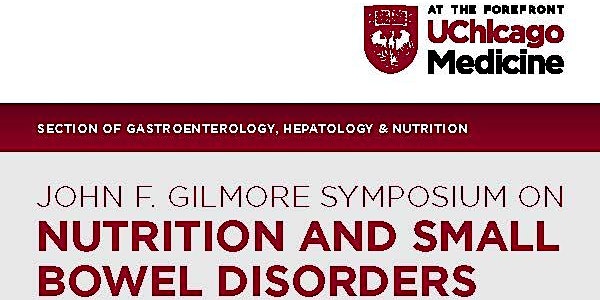

John F. Gilmore Symposium on Nutrition and Small Bowel Disorders
John F. Gilmore Symposium on Nutrition and Small Bowel Disorders
Date and time
Location
Gleacher Center
450 Cityfront Plaza Drive Chicago, IL 60611Refund Policy
About this event
- 8 hours
DESCRIPTION
Training in nutrition is a heterogeneous field, ranging from understanding metabolism in health and disease, micronutrient and macronutrient requirements, nutrient digestion and absorption, and the best route and provision of nutrition support. A broad understanding of nutrition support basics allows healthcare professionals to handle the increasing complexity of patients with multiple comorbid conditions. In addition, it allows providers to introduce the role of diet in disease management, a goal of most patients. Incorporation of the basic principles of intestinal absorption allows for a greater understanding of the role of the FODMAP diet in irritable bowel syndrome (IBS) management. Including dietary recommendations can reduce the risk of relapse of inflammatory bowel disease (IBD). Lastly, diet is the sole therapeutic strategy in celiac disease management. The goal of the John F. Gilmore Symposium on Nutrition and Small Bowel Disorders is to introduce healthcare professionals to the field of nutrition support and increase awareness of the role of diet in disease management. It will increase their comfort level with the prescription and management of artificial nutrition (enteral and parenteral nutrition) and help them explore the role of diet in specific gastrointestinal disorders.
TARGET AUDIENCE
This activity is designed for gastroenterologists, gastroenterology trainees, internists, advanced practice nurses, physician assistants, registered dietitians, nurses, and pharmacists dedicated to caring for patients with nutrition-related disorders.
LEARNING OBJECTIVES
After this activity, participants will be able to:
- Recognize basic initial recommendations for patients to manage malnutrition;
- State the basic mechanism of carbohydrate absorption and the impact of malabsorption and medications on gastrointestinal symptoms;
- Outline the appropriate management of nutrition in patients presenting with acute and chronic pancreatitis;
- Choose the appropriate enteral feeding tube based on a patient’s unique clinical condition;
- Suggest the appropriate use of parenteral nutrition (PN) with an understanding of the basics of line choice and home monitoring;
- Discuss the role of medical and nutrition-related therapies in eosinophilic gastrointestinal disorders;
- Explain techniques for managing physiologic intolerances to enteral nutrition support and mechanical complications of enteral access devices (e.g., leaking, clogged, and connection incompatibilities).